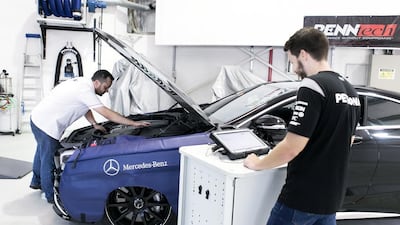Cheap counterfeit car parts including brake pads made from compressed grass are putting UAE drivers at serious risk, experts have warned.
Officials gathered at an Interpol crime conference in Dubai said the global trade in fake goods was now worth a staggering US$461 billion a year.
Across the Emirates, fake, largely Chinese parts, can often be found in less salubrious garages.
But authorities say the level of sophistication now being employed by fraudsters – especially in terms of quality of packaging – is making counterfeits much harder to spot.
Piotr Stryszowski, senior economist at the Organisation for Economic Cooperation and Development (OECD), said counterfeiting was netting criminal gangs vast profits each year.
“These numbers are not in the scale of a lottery ticket, but more like a nation’s gross domestic product,” he said.
“Every single item that has some value is vulnerable to the counterfeit market.
“High-tech products like smart phones and tablets have become a big focus so a joint approach is needed to shut down trading routes.”
Over recent years, Dubai’s Department of Economic Development has made impressive gains in fighting the counterfeit trade.
Authorities have largely succeeded in reducing the volume of luxury fake brands often found sold at Karama shops and markets in the city.
But experts say the trade in counterfeit auto parts is proving much tougher to crack.
Ever more sophisticated methods are being used to fool mechanics and garage owners, with almost perfect copies of packaging being produced.
“The counterfeit boxes are very good,” said Julian Redman, managing director of operations at SilberArrows, a garage specialising in Mercedes-Benz in Al Quoz.
“The holograms and printed part numbers look real but as soon as you take (the item) out of the box a trained professional should notice immediately the weight and feel is wrong.
“The worst case I’ve seen is when I was working at Toyota and we found brake pads that were made out of dried grass.
“They had been packed and dyed to look like rubber. It was frighteningly dangerous.”
Mechanics at SilberArrows have recently reported an increase in fake Chinese-built suspension parts that fall far short of safety standards.
Fake alloy wheels that buckle over speed bumps are also known to be a relatively common problem, as are counterfeit spark plugs.
Nerise Rivere, of Saba Intellectual Property in Business Bay, Dubai, works with BMW to help protect the brand by reporting the suppliers of fake parts to authorities.
“Many of these fake parts are being made in China and smuggled into the UAE to be sold in garages,” she said.
“It can cause serious problems on the road. Air filters, oil filters and brake pads are the most common fake BMW parts that we find when we do checks with the authorities.”
The authentic look of products can often make fakes difficult to identify.
Genuine BMW air filters have a stiff orange plastic band around their circumference, whereas fakes usually have a pink band.
Brake pads can be even harder to distinguish, although genuine packaging will always have a bar code and serial number.
“We are trying to educate our suppliers working in garages across the country, as well as border control authorities,” Ms Rivere said.
“Sharjah and Ras al Khaimah are the hot spots where these products are being sold.
“Fake products not only wear out much quicker and need to be replaced, but can be dangerous.”
_________________
Read more:
Interpol winning the war on counterfeit goods
WATCH: Karama traders put faith in value proposition after crackdown on fake goods
From US scrapyards to UAE motor auctions
__________________
It is not just the luxury car market that is vulnerable to fake spare parts.
Arun Sebastian, a senior specialist at Hyundai Mobis, suppliers to Kia and Hyundai vehicles, said more than 500,000 parts claiming to have been manufactured by the firm were seized in the UAE last year.
“Fake items are usually 70 to 80 per cent cheaper so the difference is obvious and should make people suspicious,” he said.
“It is difficult now as counterfeiting has become so intelligent and the packaging is excellent. Brake pads are the most common item we are discovering, along with filters.
“We have done tests to see how they perform compared to genuine items and the difference is huge. It really is dangerous.”


